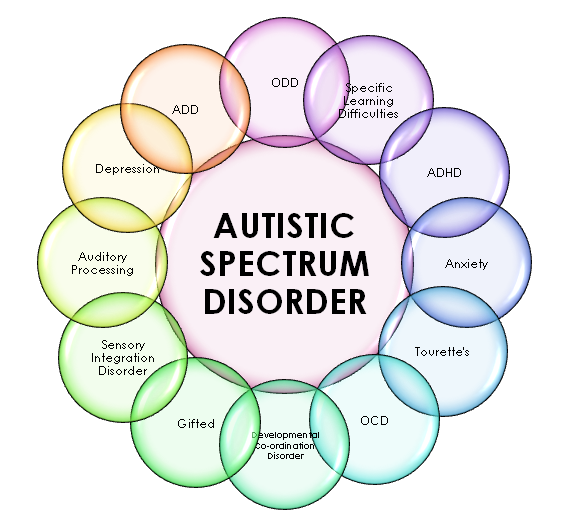Attending To Typical Misconceptions: What You Must Understand About Autism Today
Attending To Typical Misconceptions: What You Must Understand About Autism Today
Blog Article
Recognizing Autism: A Comprehensive Overview to Indications and Symptoms
Autism Range Disorder (ASD) includes a wide range of attributes that can dramatically impact an individual's social interactions and day-to-day performance. Understanding these nuances not only help caretakers and educators in offering proper assistance yet additionally fosters a more inclusive environment for people with ASD.
Introduction of Autism Range Problem
Specifying Autism Range Condition (ASD) includes identifying it as an intricate neurodevelopmental problem characterized by a variety of difficulties in social interaction, communication, and behavioral patterns. The term "spectrum" reflects the wide irregularity in symptoms and their severity, which can vary substantially from one person to one more. ASD normally materializes in early childhood, although some individuals might not obtain a medical diagnosis up until later on in life.
Variables affecting the growth of ASD include genetic proneness and ecological aspects, although the exact causes continue to be under examination. Medical diagnosis usually depends on behavioral assessments, as there are no clear-cut clinical tests for ASD. Early treatment is vital and can substantially boost end results, focusing on boosting interaction skills, social communications, and adaptive actions.
People with ASD may additionally display one-of-a-kind toughness, such as phenomenal interest to information or certain areas of expertise. Recognizing the multifaceted nature of ASD is essential for promoting an inclusive atmosphere that accommodates neurodiversity. Proceeded research is essential for developing reliable interventions and support group, enabling people with ASD to thrive and satisfy their potential within society.
Usual Signs of Autism
Identifying the common indications of Autism Spectrum Condition (ASD) is essential for early identification and treatment. These signs can vary extensively in severity and presentation, yet certain attributes are regularly observed in individuals with ASD.
One of the most prevalent signs is a significant trouble in preserving and establishing eye call. People might additionally show limited interest in social interactions and reveal a choice for singular play.
Sensory level of sensitivities are additionally usual; people may underreact or overreact to sensory stimuli, such as structures, lights, or sounds. autism. Language development can be irregular, with some youngsters showing delayed speech or using language in unusual means, consisting of echolalia-- repeating sentences or phrases heard somewhere else
It is necessary to keep in mind that not every individual with ASD will certainly present all these indications, and the degree of these actions can vary substantially. Early recognition permits prompt support and sources, enhancing the lifestyle for those on the spectrum.
Social Communication Difficulties
Social interaction challenges are a trademark of Autism Spectrum Problem (ASD), affecting a person's capacity to involve successfully with others. These problems can manifest in different ways, consisting of difficulties in initiating and keeping conversations, understanding social signs, and responding suitably in social interactions.
People with ASD may battle with nonverbal communication, such as eye call, faces, and body movement. This can cause misconceptions, as their communicative intent may find not be appropriately translated by others. They may locate it challenging to realize the nuances of tone and context, which are necessary for effective communication.
In team settings, individuals with ASD might feel overloaded and may not understand just how to join in discussions (autism). They could likewise show atypical conversational patterns, such as monologuing regarding details rate of interests without recognizing social reciprocity
Additionally, these obstacles can result in social seclusion or troubles in developing relationships, Visit This Link as peers might misunderstand their behavior or communication design. Recognizing these social communication difficulties is crucial for promoting helpful settings that advertise social skills development and improve the quality of interactions for people on the autism range.
Sensory Reactions and level of sensitivities
Several people with Autism Spectrum Problem (ASD) experience enhanced sensory sensitivities that can considerably impact their day-to-day lives. A person with ASD might discover everyday sounds, such as a vacuum cleanser or crowded environments, extremely stressful, leading to anxiety or disasters.
Sensory processing differences in people with ASD can also influence their ability to engage in regular activities and social communications. A youngster who is delicate to touch might resist physical love or avoid particular clothing textiles. Alternatively, a choice for certain appearances or tastes can limit nutritional options and produce challenges during nourishments.
Recognizing these sensory level of sensitivities is crucial for recognizing the distinct experiences of individuals with ASD. Recognition of their sensory accounts can promote far better interaction and assistance strategies, developing an environment that suits their requirements and improves their lifestyle. Inevitably, acknowledging sensory sensitivities is a vital component of comprehending the more comprehensive range of autism.

Supporting People With Autism
Efficient support for individuals with Autism Range Problem (ASD) is vital for enhancing their overall well-being and promoting self-reliance. Support methods must be customized to meet the one-of-a-kind demands of each individual, considering their challenges and toughness.

Social skills training can likewise play an essential duty. autism. Involving people in group activities or role-playing scenarios can improve their capacity to browse social communications. In addition, it is vital to inform family participants, caretakers, and peers regarding ASD to promote a comprehensive and encouraging area
Verdict
By fostering boosted interaction and social skills, individuals with autism can browse their atmospheres much more successfully. Inevitably, boosted awareness and assistance can substantially enhance the quality of life for those influenced by ASD.
Autism Spectrum Disorder (ASD) incorporates a large variety of attributes that can significantly influence an individual's social communications and everyday performance.Individuals with ASD may battle with nonverbal communication, such as eye contact, face expressions, and body language.Many people with Autism Range Problem (ASD) experience increased sensory sensitivities that can dramatically impact their day-to-day lives.Sensory processing distinctions in people with ASD can likewise influence their ability to engage in regular activities and social interactions.Recognizing these sensory sensitivities is essential for acknowledging the one-of-a-kind experiences of individuals with ASD.
Report this page